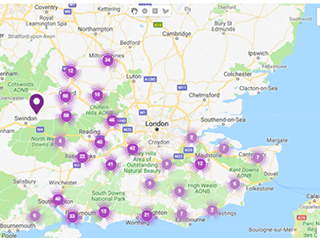Charlotte Langdon – Director and Manufacturing Specialist
I experienced first-hand the value of my network when one of my existing contacts introduced me to Innovate UK’s regional manager for London and the South East, Mr David Legg. Recognising the help and support Innovate UK can offer the manufacturing industry, I wasted no time posing some questions to David.
Tell me about yourself, your background and your current role?

I am delighted to have recently been appointed as the Regional Manager for London and South East at Innovate UK. My role is based in the Strategy and Impact Directorate and I am responsible for strategic stakeholder engagement for innovation and collaboration with the aim of increasing growth and productivity in the London and South East.
I previously led on performance and economic impact analysis and act as vice-chair of the OECD committee for innovation and technology policy. In my earlier career I worked as a government economist in various departments, including HM Treasury, BEIS, Home Office, Defra and the Environment Agency. I have an MBA from Henley Management College; MSc from University of Oxford and BSc Economics.
What are your thoughts on innovation in the UK manufacturing industry?

In my view, strengthening innovation in UK manufacturing is vital for the overall health of the UK economy, particularly as it accounts for 10% of the total economy, 44% of exports and 70% of R&D. The current political and economic uncertainty is rightly a key concern for the manufacturing business and research community. The UK is a global research and innovation nation and its manufacturing research base is a vital national asset. It has achieved this position by being open and collaborating with research partners across the world. Innovate UK has invested over £400 million in 1,600 manufacturing collaborative research projects in the London and South East region over the last twelve years which is illustrated in the maps below.
LONDON

SOUTH-EAST

Source: https://datavis.innovateuk.gov.uk/
This regional investment has enabled many businesses to develop new technologies that are now being commercialised and sold globally. I recently attended the Southampton International Boat Show that showcased a vast range of innovative new products from over 600 global marine brands. I had the opportunity to connect with engineers and designers from all over the world who are developing the latest manufacturing designs, using cutting-edge digital and AI technologies. The UK has an excellent mix of small, medium and large businesses operating in the manufacturing sector and it was fascinating to learn more about how UK businesses can harness excellence in manufacturing to improve global competitiveness, revenue and productivity.
What are the key challenges faced by the manufacturing industry?

I believe the key challenges are uncertainty in the current business environment and the recruitment and retention of skilled workers who can innovate, manufacture and commercialise new technologies. There is the additional challenge of increasing the adoption of new technologies in the manufacturing process, which is recognised as a factor constraining UK productivity. The government’s Industrial Strategy is seeking to address these issues with a focus on ideas, people, infrastructure, business environment and locations with Local Industrial Strategies being developed across all the regions in England, including London and the South East.
What are the key opportunities for the manufacturing industry?

The acceleration of technology development in the UK is creating domestic and global opportunities for UK manufacturing. Over the past few years we have seen an increase in investment and talent, enabling innovators to grow and scale operations. The Industrial Strategy Challenge Fund is an excellent example of how the UK is harnessing the combined talents across the business and research communities to develop the next generation of technologies in the manufacturing sector. Meanwhile, the weakening pound has provided a boost to UK businesses that are exporting innovative manufactured products. This has improved the relative competitiveness of UK businesses providing opportunities to gain access to new markets and develop new collaborations with international partners. However, it has also resulted in rising costs of imported inputs for manufacturing processes that can be both a challenge and an opportunity by enabling UK business to seek innovative and novel approaches for driving efficiency and productivity improvements across the manufacturing supply chain.
How can you / Innovate UK help?

Our vision is for the UK to be one of the best places in the world for businesses to innovate and grow. Our aim is to drive sustainable economic growth through business-led innovation, by giving forward-thinking businesses of all sizes access to the knowledge, partners, investment and markets they need. In total we have invested over £2.2 billion in more than 11,000 projects over the last 12 years. These have created £16 billion in gross value added to the UK economy and 70,000 jobs.
In 2018-2019 Innovate UK invested £630 million in R&D grants across the UK with matched funding from business. Approximately a third of these investments were awarded to the businesses in the South East and London region. This included innovation projects in aerospace, creative design, digital manufacturing, infrastructure, life sciences, intelligent mobility, energy and marine technologies.
Innovate UK is investing in innovation in manufacturing, anchoring this vital activity in the UK through the High Value Manufacturing Catapult, as an example. As part of our new delivery plan for 2019-2020 we have expanded and diversified the number of support opportunities that manufacturing business can benefit from including:
Industrial Strategy Challenge Fund
The Faraday battery challenge
We are investing up to £246 million to lower carbon and tackle air pollution through the development of high-performance batteries for electric vehicles and other applications that are more cost-effective, durable, safer, of lower weight and recyclable. Through this challenge, the government will invest in research and innovation projects and new facilities to scale-up and advance the production, use and recycling of batteries.
Driving the electronic revolution
We are investing £80 million from the ISCF Future of Mobility Grand Challenge. The UK is one of the top three locations in the world to develop Intellectual Property in Power Electronics, Machines and Drives. This challenge is focused on supply chains for Automotive, Aerospace, Energy (generation, distribution and consumption), Industrial, Marine, Off-Highway and Rail. Driving the Electric Revolution will fill gaps and expand the existing manufacturing capability. Experimentation and development at world leading companies and universities will allow us to develop productive manufacturing systems needed to grow quickly.
Manufacturing made smarter
We have made a £30 million investment in projects that focus on the use of Industrial Digital Technologies (IDTs) to transform the productivity and agility of UK manufacturing. The challenge will support the innovation and deployment of IDTs across industry sectors via cross-sector collaboration and learning. We welcome a variety of project types, from feasibility studies to large innovation and/or demonstrator projects. Projects must be able to achieve rapid technology development and deployment.
Smart
This is the new name for Innovate UK’s ‘Open grant funding’ programme. There are opportunities to receive up to £25 million in the best game-changing, innovative or disruptive ideas with a view to commercialisation.
Innovation Loans
We have run five innovation loans competitions through a pilot and have learned a great deal about this approach to stimulating and supporting later-stage innovation for growth-oriented SMEs. The £50m pilot has been extended in 2019 with £25m of additional funding available. I was delighted that Innovation Loans recently won the Innovative Product of the Year at the Growth Finance Awards, which recognised how this growth finance product has delivered clear and demonstrable innovation over the past 12 months.
For more information about Innovate UK, visit the website.

